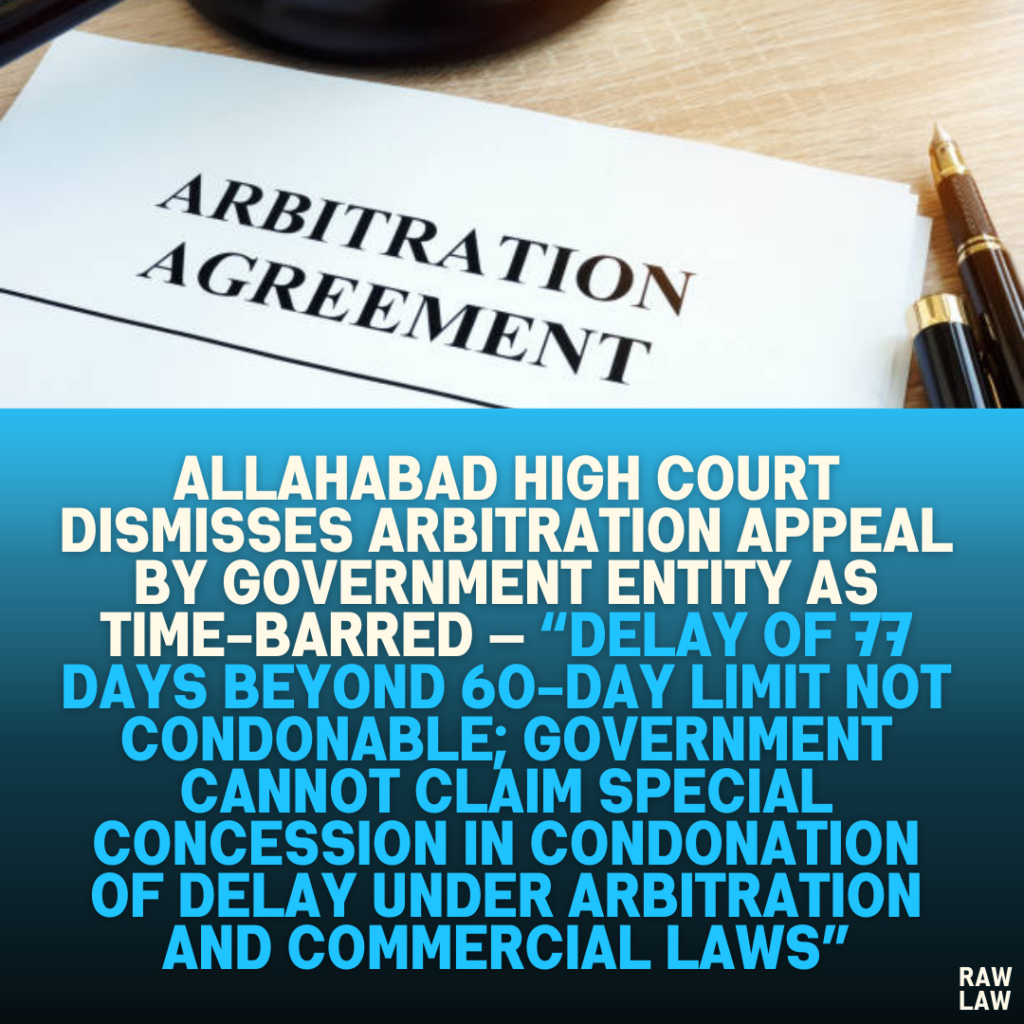Court’s Decision
The Division Bench of the Allahabad High Court (Lucknow Bench) dismissed the appeal filed under Section 37 of the Arbitration and Conciliation Act, 1996 read with Section 13 of the Commercial Courts Act, 2015. The appeal sought to challenge the Commercial Court’s order dismissing a Section 34 petition as time-barred. The High Court held that the present appeal was filed beyond the permissible limitation of 60 days and rejected the application for condonation of delay on the ground that the explanation offered did not amount to “sufficient cause.” Consequently, the appeal was held to be barred by limitation and was dismissed.
Facts
The appellants had entered into an agreement dated 21.02.2002 with the respondent-contractor for execution of repair, renovation, and extension works at various hospitals in Sultanpur district for a total price of ₹87,62,721.40. Post-completion of work, a dispute arose regarding unpaid dues under the final bill. The matter was referred to arbitration and a Sole Arbitrator passed an award on 31.01.2021, allowing certain claims of the contractor.
Dissatisfied, the appellants filed an application under Section 34 of the Act to set aside the award. However, the Commercial Court dismissed it as time-barred on 07.09.2024. This led to the filing of the present appeal under Section 37, accompanied by an application for condonation of delay.
Issues
- Whether impleading a Commercial Court or Arbitrator as a party in an appeal under Section 37 is permissible.
- Whether the appeal was barred by limitation.
- Whether the appellants had demonstrated “sufficient cause” for condonation of delay.
Petitioner’s Arguments
- The delay occurred due to a bureaucratic process involving obtaining legal opinion and approvals from the State Government.
- The certified copy of the impugned order was received late, and relevant documents took time to be collected.
- Administrative procedures and document collation justified the delay.
- Relief was sought on the basis that the appellants acted bona fide and diligently once approvals were obtained.
Respondent’s Arguments
The respondents contended that:
- The appeal was filed beyond the prescribed 60-day limitation.
- No “sufficient cause” was shown as the delay arose from administrative inertia.
- Mere government status of the appellants could not be a ground for liberal condonation of delay.
Analysis of the Law
The Court considered:
- Section 37 of the Arbitration and Conciliation Act permits appeals but does not prescribe a specific limitation period.
- Under Section 43, the Limitation Act applies, and Section 13(1A) of the Commercial Courts Act prescribes a 60-day limitation period for appeals from orders of Commercial Courts.
- The Supreme Court’s ruling in Government of Maharashtra v. Borse Brothers Engineers & Contractors Pvt. Ltd., 2021 SCC OnLine SC 233, was key. It held that even for Government bodies, condonation beyond the 60-day limit in arbitration appeals is discretionary and only short delays backed by bona fide reasons may be condoned.
Precedent Analysis
The Court discussed:
- Savitri Devi v. District Judge, Gorakhpur, AIR 1999 SC 976: Judicial officers should not be impleaded as parties unless personal allegations are made.
- Jogendrasinghji Vikaysinhji v. State of Gujarat, (2015) 9 SCC 1: Courts and Tribunals do not defend their decisions and need not be made parties.
- Union of India v. Varindera Constructions Ltd., (2020) 2 SCC 111, and N.V. International v. State of Assam, (2020) 2 SCC 109: Delay beyond 120 days in Section 37 appeals is not condonable.
- Borse Brothers Engineers & Contractors Pvt. Ltd. (2021): Delay may be condoned by way of exception, not rule; government agencies do not get special treatment in condonation matters.
Court’s Reasoning
The Court found:
- The appeal was delayed by 77 days (from initial filing) and 93 days (upon re-filing with corrected defects), far beyond the prescribed 60-day limitation.
- The explanation of delays caused by legal opinion, internal approvals, and document retrieval failed to meet the standard of “sufficient cause.”
- Government machinery’s bureaucratic processes could not justify condonation, as per the Apex Court’s ruling in Postmaster General v. Living Media India Ltd., (2012) 3 SCC 563.
- There was no personal allegation against the Arbitrator or Presiding Officer; hence, their impleadment was unnecessary and deprecated.
Conclusion
The High Court held:
“The appeal is held to be time barred and is, accordingly, dismissed.”
The application for condonation of delay was rejected on the ground that:
“Government departments are under a special obligation to ensure that they perform their duties with diligence and commitment. Condonation of delay is an exception and should not be used as an anticipated benefit for the government departments.”
Implications
- Reinforces strict adherence to limitation in arbitration matters.
- Sends a strong signal against the bureaucratic delay by government bodies in pursuing legal remedies.
- Clarifies that judicial officers and arbitrators should not be impleaded as parties unless personal misconduct is alleged.
- Upholds the objective of speedy dispute resolution under arbitration and commercial laws.



